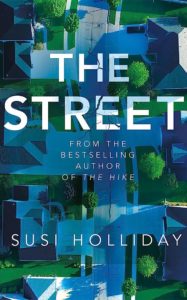It’s no surprise that Anna and Peter have been moved in The Street from London to a brand-new, upscale, little development in Scotland because they’re in witness protection. Anna’s experiencing high anxiety, she and Peter are very much at odds, and their new home is too meticulously furnished and equipped. The street of eight houses itself is on the creepy side: “perfect white cubes with their perfect gardens.”
Tension mounts when Anna starts meeting the neighbors, all of whom live in identical homes whose doorbells play the same annoying tune. You start to wonder: Are they cult members? Aliens? Spies? Is this some weird kind of prison? The enclave is gated and there are security cameras, okay, but why does Anna have a very intrusive phone app?
Something is definitely amiss on this street, because no matter who Anna talks to after her boozy first night (more about that below), she experiences “an odd sensation, a shift in the atmosphere that seemed to happen every time she spoke to one of the residents.”
Their next-door neighbors seem like fun, drink a lot, and enjoy Indian food just like Anna and Peter, and the four of them have a hard-drinking, hilarious night before the couple have settled in (or tried to). But the day after, those neighbors have disappeared and their house is totally empty. Everyone on the street denies they were even there. . .
It’s an intriguing hook if you’re going to be hooked.
As the book progresses, we learn through flashback chapters more about how the couple came to be ripped out of their London lives and planted in Scotland, and why they might be in profound danger. She’s a writer and he’s a carpenter but each of them is far more complex than they first appear to be, and they have some ugly stuff to hide from the world and each other.
Holliday writes keenly about fear, paranoia, and how married couples can work each other’s last nerve and not have any idea who they’re really married to. She builds tension skillfully and keeps you actively guessing as to what’s going to happen next.
All the same, the book has a gigantic sinkhole of a problem: the explanation for all the strange behavior on Anna’s street was so obvious early on that you may wonder why Anna couldn’t figure it out herself. After all, she’s a crime novelist. The time changes throughout the book complicate the storyline, but they don’t camouflage the excruciatingly simple solution that’s apparent before the book truly takes off. This is a mystery that’s ultimately not mysterious enough. ★★
Lev Raphael is the former crime fiction reviewer at The Detroit Free Press.


